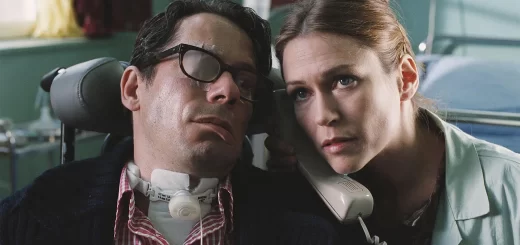I Don’t Know Why You Should Want to Hide, by Scott Nye
A young woman, maybe even a girl (Marine Vacth), walks along the beach in a bikini. She settles onto a blanket. Through binoculars, we see her survey her surroundings and remove her bikini top. The camera pulls back further, and we see that it is a boy in his early teens watching her. Back on the beach, she sunbathes topless as the shadow of an arm passes across her chest. It disrupts her light. She looks up. A wide shot reveals it to be the boy with the binoculars. She regards him familiarly, and replaces her top without shame at his presence; after all, he’s only her brother.
So begins François Ozon’s remarkable new film, Jeune & Jolie (Young & Beautiful). It is all about these sort of intrusions of privacies both banal and intimate, and the limits of perception for those on the outside – including the film’s audience. One party or another will be presented with a scene or moment that seems obvious in its intention or foundation, only to have its meaning reversed, undermined, or subverted. Relationships are revealed, intentions not quite as sinister (or perhaps more so). Whatever we think we know, we don’t know everything. This is not a mystery or a thriller or a twist-filled mind-bender; it’s a film about the mysteries, thrills, and twists of existing in relation to other people.
When they return to their family’s vacation house, the boy, Victor (Fantin Ravat) wanders from room to room. In one, his parents rest comfortably. In another, we hear moans and gasps as he approaches; just an upset baby being calmed. The next set of similar sounds, however, come from his masturbating sister, Isabelle, whom he observes for a time long and uncomfortable enough to warrant suspicion that their prior beach encounter was less playfully motivated than might be rationalized.
Isabelle is fooling around with an older boy named Felix, who is vacationing in the same spot. He’ll take her virginity as she imagines herself watching the decidedly unromantic scene. The next evening, she’ll celebrate her seventeenth birthday. When we next see her, back in Paris, she is meeting a much older man in a hotel room, and there’s money on the table – this scene, anyway, is one of the few that can be taken at face value. It is never fully revealed, however, what Isabelle gets from all this. She never seems to really enjoy the sex; she never spends the money, nor indicates that it might fuel some larger endeavor; she lives comfortably and her parents afford her all the standard qualities of middle-class teenage life while she attends a nice school.
At the theatre, Isabelle spots a family friend gently stroking her mother’s cheek. Her father walks in on her in the shower, and later, on Victor as he masturbates (across the hall, he can hear Isabelle enjoying similar ecstasy). The scene in which a woman walks in on her significant other in a compromising, but actually fairly innocent, interaction with another woman has been done to death for cheap comedy; here, it takes on dimensions of self-hatred, fear, paranoia, and ignorance. Isabelle is viewed differently by everyone in her circle – her family believes her to be studious and shut-in, her best friend thinks her a virgin, her brother sees her as worldly and passionate, her clients as melancholy and distant. Nearly all of them remark on the qualities mentioned in the title, as though that about sums her up. But nothing any of us know of her could properly do that. The truth of her activities does not clarify matters; it only creates different misconceptions.
She later indicates that the lifestyle of a prostitute is its most alluring quality – the secrecy, the quantifiable admiration, the illusion of a fabricated identity. She doesn’t say it, but no doubt the independence of it appeals very much to someone approaching adulthood. Yet because of Ozon’s decision to keep so much hidden (and because Vacth is so fine at suggesting without confronting or divulging), it’s hard to say for sure whether that sums it up, whether it’s possible for Isabelle to know herself so fully when so many others in her vicinity are mistaken about what they perceive to be true. Besides, who really understands themselves so well at seventeen?
Young women are so alluring in part for their elusiveness, and Ozon understands that this is not merely a put-on; Isabelle frequently runs from confrontation, towards conflict, and refuses the possibility of true intimacy at every turn. She must remain the one in control, with the most power, but she’s hardly a Machiavellian figure. At least, not yet. Ozon utilizes the ambiguous ending, a once-radical decision that has been used as a crutch too often by cinema’s laziest disciples, but, again, because unknowability is at the center of his film, it is necessary and well-earned to resist conclusion. Like his characters, his camera only watches, charged by the sexuality but not worshipful or leering towards it; unlike them, he does not judge or rush to simplifications and certainties. Human beings are too incomprehensible, too unpredictable, so much richer and beautiful than even their most pleasing appearance suggests.




























